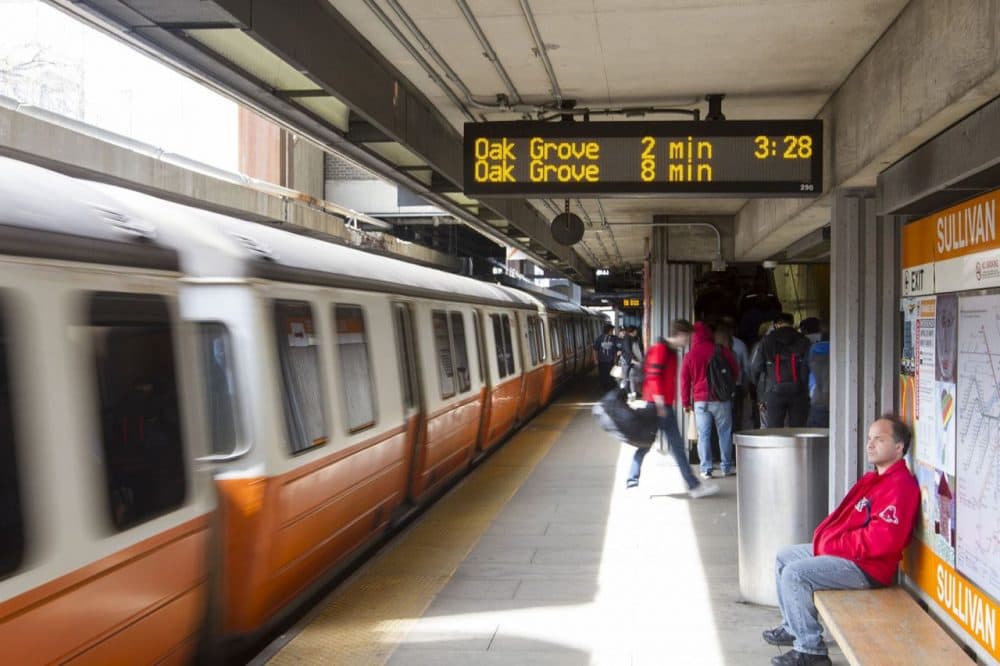Advertisement
Senators Seek To Clarify Limits On MBTA Fare Hikes

The Senate on Thursday adopted a budget amendment that would cap future MBTA fare increases at 5 percent every two years, marking what some senators described as the second time three years they had staked out such a position.
The budget rider would not affect the average 9.3 percent T fare increase set to go into effect July 1.
Debate over the potential fare hikes revealed two different interpretations over wording in the 2013 law, which includes a section saying the MBTA "shall not increase fares at intervals of less than 24 months or at an annual rate greater than 5 per cent."
Transportation officials said the law capped fare hikes at 5 percent annually every two years, while senators involved in writing the law maintained it was meant to place the cap at a total of 5 percent over the two-year period.
"The intent was clear," Sen. Kathleen O'Connor Ives, a Newburyport Democrat, said during Thursday's budget debate. "My office went back to the video...to understand the legislative intent, and it was clear. We voted as a body to have these moderate limitations so that the success of the MBTA and the commuter rail would not be placed on the backs of the ridership."
Sen. Sonia Chang-Diaz, a Jamaica Plain Democrat, who said her amendment might sound "familiar" to lawmakers, said it would help advance the policy goals of a healthier state that creates less greenhouse gas emissions by encouraging public transit options.
"When we allow it to be undercut and we allow these fare increases to happen at a rate that's unsustainable, unpredictable, unaffordable for riders we are working at cross-purposes with all those other policy goals," Chang-Diaz said.
The 34 to 5 vote did not follow party or geographic lines as opponents of the amendment were Democrats Sen. William Brownsberger of Belmont and John Keenan of Quincy, both squarely with in the T service area, and Democrat Sen. Michael Moore of Millbury along with Republican Sens. Donald Humason of Westfield and Vinny deMacedo of Plymouth.
Senate Minority Leader Bruce Tarr, a Gloucester Republican, said he doesn't "necessarily disagree with this amendment" but expressed concern that the Senate could set up a situation "where we may need other sources" for the T.
Advertisement
DeMacedo said the Fiscal and Management Control Board set up to oversee the T last summer was making progress and argued against tinkering with its tools.
"We put something in place, they're working with it, and now we're going to change it a little bit, and we'll change it a little bit more," deMacedo said. He said, "This in my opinion is a slippery slope for us."
Chang-Diaz's amendment bars an increase on a fare by more than 5 percent every 24 months. It defines fares comprehensively as including the "cost of any single-ride price for a mode, the cost of a pass, and any discount from the cost of a single-ride price or the cost of pass, regardless of fare payment type, product, or media."
The control board sequestered the estimated $42 million in revenue from the July 1 increase for capital repairs, and adopted a resolution that the T should not raise fares again until at least January 2019 -- six months beyond the current statutory limit.
Chang-Diaz told the News Service school principals in her district have said "kids are already not showing up because they can't afford the fare as it is, and so this is going to compound that problem."
Sen. Tom McGee, a Lynn Democrat who is co-chairman of the Transportation Committee, said the 2013 tax law was unclear on whether fare increases were capped at 5 percent or 10 percent every two years.
If the fare hike cap makes it into the final budget worked out by House and Senate negotiators, it would take effect on Jan. 1, 2017.